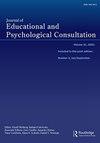新手顾问需要什么样的支持?建构主义基础理论研究
IF 1.1
4区 心理学
Q4 PSYCHOLOGY, EDUCATIONAL
Journal of Educational and Psychological Consultation
Pub Date : 2020-10-11
DOI:10.1080/10474412.2020.1816473
引用次数: 3
摘要
研究表明,有必要对在文化和语言多样性学校工作的顾问进行更好的培训。本研究采用基于建构主义的理论方法,调查了咨询同伴反馈过程(CPFP)作为在顾问中培养技能和观点的工具的使用情况。本研究分析了培训顾问(CIT)要求的反馈类型及其同行确定的优势和反馈。确定了编码词典和主题,以了解CIT在请求和接收反馈时的需求。这导致了一个以建构主义为基础的理论,描述了CIT如何学会与CLD学校的案例进行协商。对42份CPFP摘要的详细分析表明,CPFP基于实力的性质在CIT请求支持的领域为其提供了支持,提供了鼓励和具体反馈,并扩大了CIT对案件和问题的了解,使其超越了直接的背景和视角。讨论了对研究和培训顾问的影响。文章历史接收日期2020年1月21日修订日期2020年8月13日接受日期本文章由计算机程序翻译,如有差异,请以英文原文为准。
What Kinds of Support Do Novice Consultants Request and Receive? A Constructivist Grounded Theory Investigation
Research indicates the need for better training for consultants working in culturally and linguistically diverse (CLD) schools. Using a constructivist grounded theory approach, this study investigated the use of the Consultation Peer Feedback Process (CPFP) as a tool for developing skills and perspectives among consultants. This study analyzed the types of feedback requested by consultants-in-training (CITs) and their peer-identified strengths and feedback. A coding lexicon and themes were identified to understand the needs of CITs when requesting and receiving feedback. This led to a constructivist grounded theory that describes how CITs learn to consult with cases in CLD schools. Detailed analyses of 42 CPFP Summaries indicated that the strength-based nature of the CPFP supported CITs in areas where they requested support, provided encouragement and specific feedback, and expanded CITs’ exposure to cases and issues beyond their immediate setting and perspectives. Implications for research and training consultants are discussed. ARTICLE HISTORY Received 21 January 2020 Revised 13 August 2020 Accepted 21 August 2020
求助全文
通过发布文献求助,成功后即可免费获取论文全文。
去求助
来源期刊

Journal of Educational and Psychological Consultation
PSYCHOLOGY, EDUCATIONAL-
CiteScore
3.40
自引率
23.50%
发文量
20
期刊介绍:
The Journal of Educational & Psychological Consultation (JEPC) provides a forum for improving the scientific understanding of consultation and for describing practical strategies to increase the effectiveness and efficiency of consultation services. Consultation is broadly defined as a process that facilitates problem solving for individuals, groups, and organizations. JEPC publishes articles and special thematic issues that describe formal research, evaluate practice, examine the program implementation process, review relevant literature, investigate systems change, discuss salient issues, and carefully document the translation of theory into practice.
 求助内容:
求助内容: 应助结果提醒方式:
应助结果提醒方式:


